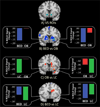Monetary reward processing in obese individuals with and without binge eating disorder
- PMID: 23462319
- PMCID: PMC3686098
- DOI: 10.1016/j.biopsych.2013.01.014
Monetary reward processing in obese individuals with and without binge eating disorder
Abstract
Background: An important step in obesity research involves identifying neurobiological underpinnings of nonfood reward processing unique to specific subgroups of obese individuals.
Methods: Nineteen obese individuals seeking treatment for binge eating disorder (BED) were compared with 19 non-BED obese individuals (OB) and 19 lean control subjects (LC) while performing a monetary reward/loss task that parses anticipatory and outcome components during functional magnetic resonance imaging. Differences in regional activation were investigated in BED, OB, and LC groups during reward/loss prospect, anticipation, and notification.
Results: Relative to the LC group, the OB group demonstrated increased ventral striatal and ventromedial prefrontal cortex activity during anticipatory phases. In contrast, the BED group relative to the OB group demonstrated diminished bilateral ventral striatal activity during anticipatory reward/loss processing. No differences were observed between the BED and LC groups in the ventral striatum.
Conclusions: Heterogeneity exists among obese individuals with respect to the neural correlates of reward/loss processing. Neural differences in separable groups with obesity suggest that multiple, varying interventions might be important in optimizing prevention and treatment strategies for obesity.
Copyright © 2013 Society of Biological Psychiatry. Published by Elsevier Inc. All rights reserved.
Conflict of interest statement
All other authors report no biomedical financial interests or potential conflicts of interest.
Figures



References
-
- Di Chiara G. Dopamine in disturbances of food and drug motivated behavior: A case of homology? Physiol Behav. 2005;86:9–10. - PubMed
-
- Kelley AE, Baldo BA, Pratt WE, Will MJ. Corticostriatalhypothalamic circuitry and food motivation: integration of energy, action and reward. Physiol Behav. 2005;86:773–795. - PubMed
-
- Need AC, Ahmadi KR, Spector TD, Goldstein DB. Obesity is associated with genetic variants that alter dopamine availability. Ann Hum Genet. 2006;70:293–303. - PubMed
-
- DelParigi A, Chen K, Salbe AD, Reiman EM, Tataranni PA. Sensory experience of food and obesity: A positron emission tomography study of the brain regions affected by tasting a liquid meal after a prolonged fast. Neuroimage. 2005;24:436–443. - PubMed
-
- Matsuda M, Liu Y, Mahankali S, Pu Y, Mahankali A, Wang J, et al. Altered hypothalamic function in response to glucose ingestion in obese humans. Diabetes. 1999;48:1801–1806. - PubMed
Publication types
MeSH terms
Grants and funding
- R01-DA020908/DA/NIDA NIH HHS/United States
- P20 DA027844/DA/NIDA NIH HHS/United States
- K12-DA00167/DA/NIDA NIH HHS/United States
- RL1 AA017539/AA/NIAAA NIH HHS/United States
- P20-DA027844/DA/NIDA NIH HHS/United States
- R01-DK073542/DK/NIDDK NIH HHS/United States
- R01 AA016599/AA/NIAAA NIH HHS/United States
- PL1 DA024859/DA/NIDA NIH HHS/United States
- K12 DA000167/DA/NIDA NIH HHS/United States
- K24 DK070052/DK/NIDDK NIH HHS/United States
- R01 DA019039/DA/NIDA NIH HHS/United States
- R01-AA016599/AA/NIAAA NIH HHS/United States
- PL1-DA024859/DA/NIDA NIH HHS/United States
- P50-AA012870/AA/NIAAA NIH HHS/United States
- R01 DA020908/DA/NIDA NIH HHS/United States
- R01-DA019039/DA/NIDA NIH HHS/United States
- 2K24-DK070052/DK/NIDDK NIH HHS/United States
- R01 DK073542/DK/NIDDK NIH HHS/United States
- RL1-AA017539/AA/NIAAA NIH HHS/United States
- P50 AA012870/AA/NIAAA NIH HHS/United States
LinkOut - more resources
Full Text Sources
Other Literature Sources
Medical
Miscellaneous

